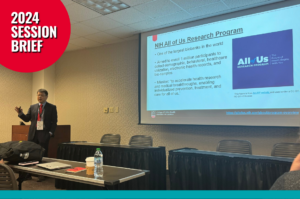By Gracie Howard
 Obstacles to healthcare for rural farmers, particularly mental healthcare, have become an area of concern across the state of Georgia. Findings reporting as much were delivered by researchers leading a breakout session panel discussion during the 13th annual State of the Public’s Health Conference held on Thursday, Oct. 24, at the Georgia Center for Continuing Education in Athens.
Obstacles to healthcare for rural farmers, particularly mental healthcare, have become an area of concern across the state of Georgia. Findings reporting as much were delivered by researchers leading a breakout session panel discussion during the 13th annual State of the Public’s Health Conference held on Thursday, Oct. 24, at the Georgia Center for Continuing Education in Athens.
The purpose of the yearly event is to help encourage and continue conversations on how those at UGA and beyond can create a healthier, safer and more equitable world for all. This year, public health researchers Anne Montgomery, Chris Scoggins, John McEleven and Adam Chen led an informative talk on rural health and wellbeing, tackling issues of farmer suicide rates and barriers to rural healthcare resources.
“Farm workers have an incredibly high suicide rate,” Scoggins explained during the panel discussion. “In Georgia in particular, it’s the highest rate of any industry studied.”
In a study authored by Scoggins, Montgomery and McEleven on gender-related stressors and coping mechanisms in rural farmers, they found that first generation female farmers were the most likely to contemplate suicide. Scoggins and Montgomery shared that it’s not completely clear why female farmers are more likely to consider taking their own life, but main contributing factors may lie in the gender roles that women commonly take on, such as simultaneously working full time and tending to their homes and families.
Their research found that a notable proportion of female farmers were found to experience depression five to 12 times per year and experienced a slightly higher frequency of suicidal ideation than males, although males reported more unhappiness in their farm roles.
Dr. Adam Chen’s work focused on healthcare barriers for rural people to participate in the All of Us Research Program (AoURP), one of the largest biorepositories in the world that gives opportunities for advancements in biomedical research. Field interviews highlighted that rural people are a historically underrepresented class in biomedical research due to a general lack of resources in rural communities, including distance to program sites, lack of familiarity with the healthcare system, and a mistrust of government agencies.
“Rural [people] tend to be more likely to have a chronic disease, and more likely to be older adults,” Chen said. “So, there’s a different disease and health profile [for rural versus urban populations], and we want to have a good representation of rural populations in the All of Us Research Program.”
Research discussed in the panel is ready to improve rural quality of life by providing more opportunities, knowledge and resources for Georgians to access healthcare and mental health resources. For questions, please contact Anne Montgomery ([email protected]) or Adam Chen ([email protected]).
